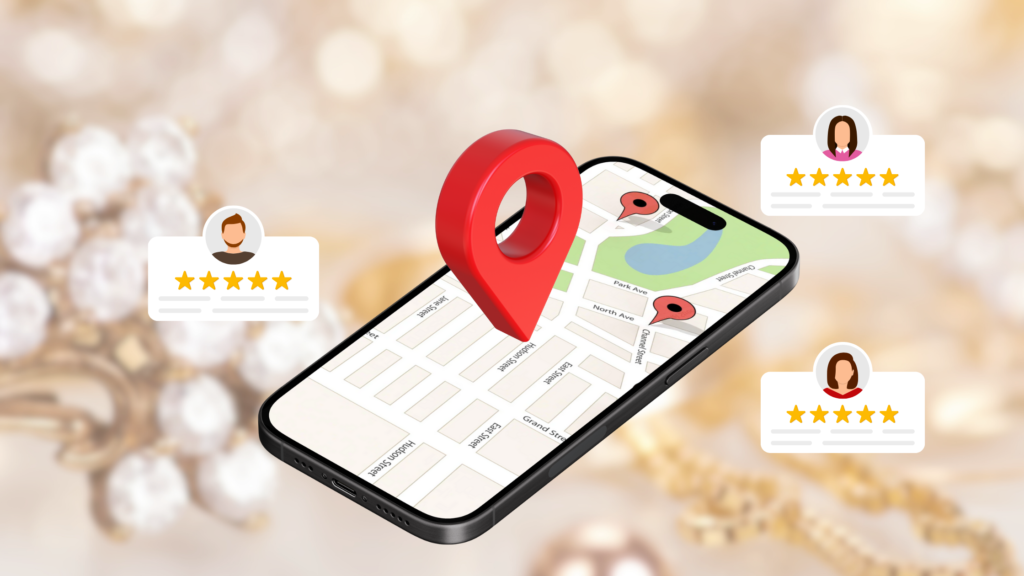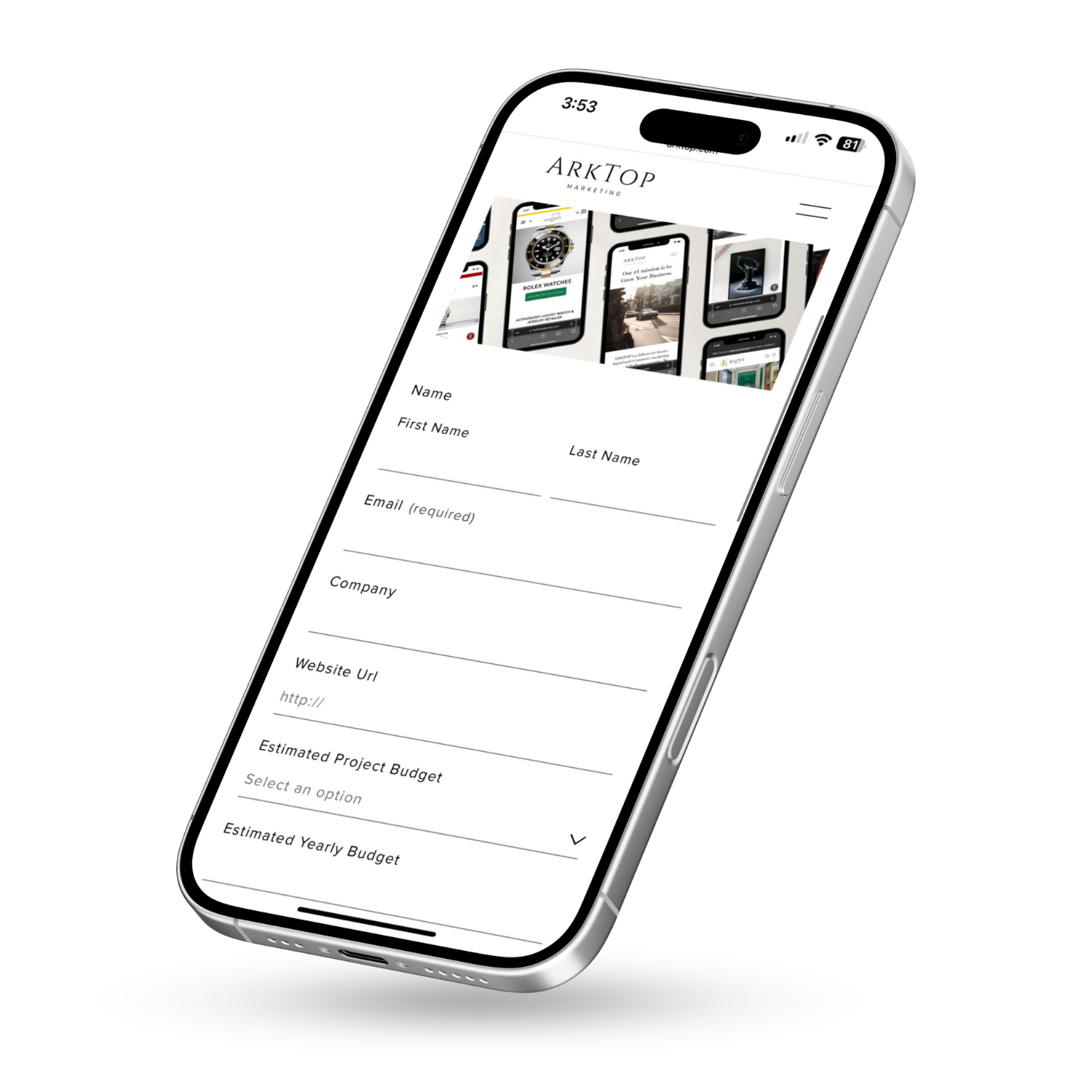For luxury brands, having a strong online presence isn’t just important…it’s the foundation of your success.
You’ve probably heard about this thing called Digital Marketing and how it can help you boost sales, increase revenue, and enhance your online presence.
Well, guess what? It’s true!
In this blog post, we’re diving into everything you need to know about digital marketing for luxury brands and why it’s a game changer for your business. Let’s get started!
What is Digital Marketing?
Digital marketing encompasses a variety of online marketing strategies designed to connect businesses with their target audience.
Unlike traditional marketing, it relies on digital channels like search engines, social media, and email to drive engagement and sales. Because it is online, it makes it much easier to track where those leads are coming from vs the old school way of flyers and billboards which you can never tell if it is really working or not. This is why digital marketing has become the preferred choice for brands… trackable results.
Key Components of Digital Marketing
Digital marketing is a complex field with a lot of moving parts that work together to create a solid strategy. It’s important to understand the basics of each area so you know what your marketing team or agency is talking about. Here are some of the key categories:
Search Engine Optimization (SEO)
SEO, or Search Engine Optimization, is all about optimizing your website so it ranks higher on search engines like Google and Bing. The better your rankings, the more organic traffic you’ll drive to your site.
SEO is made up of several important areas: Technical SEO, On-Page SEO, and Off-Page SEO. Each plays a crucial role, so it’s worth understanding the basics of each:
Technical SEO
This is exactly what it sounds like: technical stuff like coding, site speed, and schema markup. It’s the behind-the-scenes work that makes your site run smoothly and helps search engines crawl and understand your site. These are often one-time tasks handled by developers, but it’s a good idea to check on your Technical SEO a few times a year to make sure everything is still in shape.
On-Page SEO
On-Page SEO focuses on optimizing the content and structure of your website. This includes things like headings, meta tags, and content layout. It’s about making your website easy to navigate and ensuring search engines know exactly what each page is about. This is an ongoing process that requires regular updates to keep everything optimized.
Off-Page SEO
This might be the trickiest of the three. Off-Page SEO is all about building backlinks, which are links from other websites back to yours. Backlinks act like votes of confidence, showing Google that your site is trustworthy and authoritative. The more high-quality backlinks you have, the easier it is to rank higher.
However, getting backlinks isn’t as easy as it sounds. Unless you already have connections willing to link to your site, it can take time and effort to build them. But backlinks are a big deal. Think about why a site like Wikipedia ranks so well. It’s massive, has tons of pages, and is packed with backlinks.
At this point, you might be wondering if all of this effort is worth it.
The short answer?
Yes. At ARKTOP, we’ve helped clients achieve incredible results with tailored SEO strategies. For example, we worked with a Rolex Official Jeweler to reach an all-time high of 18,000 keyword rankings. These included high-intent keywords like “Engagement Rings,” “Diamond Tennis Bracelets,” and “Luxury Watches.” The result? Enhanced visibility, more traffic, and ultimately, more customers.
Content Marketing:
Whether you realize it or not, you interact with other brands’ content marketing every single day. How do I know? Well, you’re doing so right now. Content marketing is all about putting out high-quality content that engages and informs your audience. It’s not just something businesses should do, it’s something that’s more important than ever.
Why? Because roughly 70% of searches on Google have never been searched before. If you can fill that void with great content, you can rank for those searches and get in front of the right audience. Plus, content marketing helps grow your website and build authority online, making it easier to educate potential customers and drive sales.
Content marketing isn’t just about blog posts. It covers everything from blogs to videos and everything in between. If it’s on your website, it likely falls into some category of content marketing.
One important thing to note: with the rise of AI, content marketing has become much easier for small businesses. But it’s also led to a flood of mediocre content. If you want your content to stand out, focus on creating original, high-quality content that truly resonates with your audience.
Social Media Marketing:
I’d be surprised if anyone reading this doesn’t already know what Social Media Marketing is, but just in case, let’s break it down. Social media platforms like Instagram and TikTok are essential for reaching luxury consumers. Social Media Marketing helps brands connect with new audiences while keeping their current audience engaged by creating visually compelling campaigns that resonate.
When people talk about Social Media Marketing, they often mean organic efforts, like posts and stories, but it can also include paid ads. While platforms like Meta (Facebook and Instagram) offer powerful paid ad options, these are typically categorized under PPC advertising.
Organic Social Media Marketing focuses on building your brand’s presence through consistent, engaging, and relevant content. It’s about creating a voice for your brand and showing up where your audience is already spending their time.
Pay-Per-Click Advertising (PPC):
Want to see results fast? Who doesn’t! That’s what makes PPC such an essential part of digital marketing. If you’ve ever looked at job postings for digital marketing, you’ve probably noticed that PPC specialists are in high demand. The reason is simple: PPC delivers immediate results, making it ideal for brands launching new products or targeting specific demographics.
Here’s how it works: You set a budget, let’s say $1,000 per month, for your ads. This budget can be used on platforms like Google Ads, where you only pay when someone clicks on your ad. It’s a pay-to-play approach, but don’t be fooled into thinking it’s simple. Running a successful PPC campaign takes skill, which is why so many businesses hire specialists to manage their ads.
Without the right expertise, it’s easy to waste your budget on the wrong keywords, audiences, or strategies that won’t move the needle. A skilled PPC specialist ensures your budget is used effectively, creating ads that resonate with your audience and generate a strong return on investment.
Oh, and here’s a fun stat: Google estimates that, on average, businesses earn $2 for every $1 spent on Google Ads. Sounds like a pretty good deal, right?
Email Marketing:
Just like everyone else, we get a ton of these every week…emails. But here’s the thing: email marketing is one of the oldest forms of digital marketing, and it’s still one of the most effective.
Email marketing is exactly what it sounds like: personalized, automated emails designed to nurture leads and keep your customers engaged. It’s a powerful tool that can be used in countless ways, whether you’re promoting a new service, showcasing a product collection, or sharing your brand’s story.
What makes email marketing so effective is its ability to directly connect with your audience. Unlike other forms of marketing, email lands straight in your customers’ inboxes, giving you a unique opportunity to build relationships and drive action. From welcome emails to abandoned cart reminders, these messages can be tailored to meet your audience where they are in the customer journey.
And don’t underestimate its versatility. Email marketing isn’t just about sales, it’s about building trust and providing value. For instance, you can share helpful tips, exclusive offers, or even behind-the-scenes content to make your audience feel like part of your brand’s community.
The best part? Email marketing works for businesses of all sizes. Small businesses can use it to compete with larger companies, while established brands can use it to stay top-of-mind and maintain customer loyalty.
Why is Digital Marketing Important?
Why is digital marketing so important for luxury businesses? The answer is simple: it puts your brand in front of the right audience, whether you want to target them precisely or reach a broader group. Unlike traditional marketing, digital marketing offers transparency and trackability
that allows you to see exactly what’s working and adjust as needed.
Here’s what sets digital marketing apart:
- Cost-Effectiveness: Reach a global audience without the hefty price tag of traditional advertising methods. Whether you’re running a campaign on Google, Instagram, or TikTok, you can achieve impressive results on a fraction of the budget.
- Targeted Campaigns: Engage specific demographics with pinpoint accuracy. Digital marketing tools allow you to target by location, interests, behaviors, and even income levels, ensuring your message reaches the right people.
- Real-Time Results: Unlike traditional campaigns that require weeks or months to measure success, digital marketing gives you instant insights. This means you can adjust strategies on the fly to maximize results and ROI.
Take ARKTOP’s work with Hamra Jewelers as an example. In just 90 days, our targeted SEO campaign delivered an 84.3% increase in active users. This kind of rapid growth is possible because digital marketing doesn’t just focus on visibility, it focuses on measurable, impactful results.
Top Tools and Platforms
Digital marketing success doesn’t just happen, it’s built on the foundation of the right tools and platforms. These tools help streamline processes, uncover insights, and ensure your campaigns are as effective as possible. Here are some of the best tools we rely on:
- SEO Optimization: Tools like SEMrush and Ahrefs are invaluable for keyword research, backlink analysis, and tracking your website’s performance. They help ensure your site stays competitive and ranks for the right terms.
- Social Media Management: Platforms like Hootsuite and Buffer make it easy to schedule, manage, and analyze social media posts across multiple platforms. They’re perfect for keeping your brand consistent and engaging with your audience.
- Creative Design: Canva and Adobe Creative Suite are go-to tools for creating stunning visuals that stand out. Whether it’s social media graphics, web banners, or video content, these tools help bring your ideas to life.
- Analytics: Google Analytics and HubSpot are critical for tracking performance. From website traffic to lead generation metrics, these tools provide the data you need to make informed decisions and optimize your strategy.
Common Challenges in Digital Marketing
Digital marketing can deliver incredible results, but it’s not without its challenges. Here are some of the most common obstacles businesses face:
- Algorithm Changes: Platforms like Google, Instagram, and TikTok frequently update their algorithms, which can impact your visibility overnight. Keeping up with these changes is critical to maintaining and improving your rankings.
- Saturated Markets: In competitive industries, standing out can feel like an uphill battle. It takes creativity, strategy, and persistence to cut through the noise and capture your audience’s attention.
- Resource Allocation: Finding the right balance between budget, time, and effort to maximize ROI can be tricky. Investing too much in the wrong areas or too little in the right ones can hinder your success.
At ARKTOP, we mitigate these challenges with data-driven strategies and innovative tools. One example is CrownSync, a solution developed by our founder Nelson Huang. CrownSync leverages AI to streamline client communications, improve efficiency, and ensure compliance with industry standards, helping businesses stay ahead in a constantly evolving digital landscape.
Getting Started With Digital Marketing
If you’re a jeweler or luxury brand looking to generate more leads and sales, digital marketing is the perfect way to grow your business. Here’s how to get started with a few simple steps:
- Set Clear Goals: Decide what you want to achieve. Is it brand awareness, increasing sales, or building customer loyalty? Clear objectives will guide your strategy and help measure success.
- Understand Your Audience: Use data to learn who your customers are, what they’re searching for, and where they spend their time online. Tailoring your approach to their preferences is key to reaching them effectively.
- Build a Strategy: A strong digital marketing plan combines multiple channels like SEO, content marketing, PPC, and social media. This multi-channel approach ensures you reach your audience at every stage of their journey.
- Track Progress: Use analytics tools to monitor performance. Whether it’s website traffic, engagement rates, or sales, tracking progress lets you refine your campaigns and improve results over time.
Conclusion
Digital marketing is essential for thriving in today’s competitive landscape. From optimizing SEO to running creative ad campaigns, the opportunities to grow your brand are limitless. For luxury businesses like jewelers, standing out requires a strategic and refined approach, and that’s where ARKTOP comes in.
At ARKTOP, we tailor every campaign to meet your unique needs, ensuring your brand captures attention and drives results. Ready to elevate your digital marketing strategy? Schedule a consultation today and take the first step toward unmatched growth and success.












